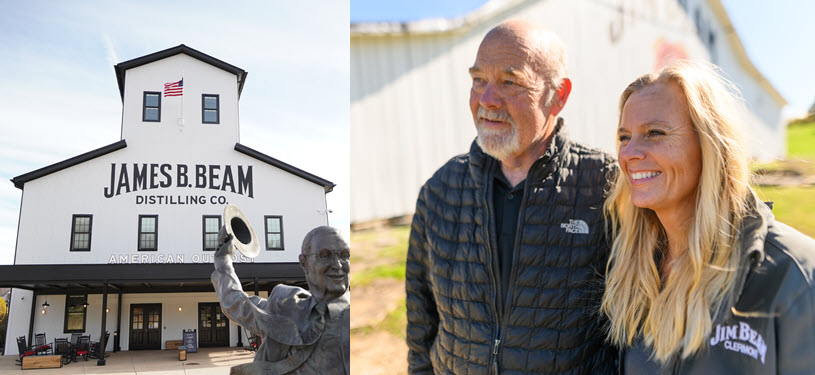
The Beam family is synonymous with bourbon making in the United States. Beam and his descendants have been making whiskey since 1795. The only time whiskey making operations were interrupted was during Prohibition. Since the passing of the 21st Amendment the Beam family and its eight generation of distillers have been making bourbon whiskey non-stop in Kentucky.
That family tradition is an important component in the bourbon whiskey making process and for 7th Generation Master Distiller Frederick “Fred” Booker Noe III, family is everything. Fred B. Noe is the great grandson of bourbon pioneer Jim Beam and is now master distiller at the James B. Beam Distilling Co. in Clermont, Nelson County, Kentucky, just like his father before him. In fact, he lives in the same house as his father once lived in downtown Bardstown.
“As I did in work, I followed in my father’s footsteps as far as health goes,” said Noe. “He developed diabetes, had kidney issues and that was his demise. As I got a little older, I developed a little blood sugar issue and Type 2 diabetes, and I started trying to work on it — but it kind of took over.”
Noe decided to explore the possibility of a kidney transplant after consulting with specialists at Nephrology Associates of Kentuckiana. Because of their strong partnership with the UK HealthCare Transplant and Speciality Clinic in Louisville, he was connected with Malay Shah, M.D., surgical director of the Liver Transplant Program and a kidney transplant specialist.
Bourbon is the family business, and when Noe needed a kidney, he didn’t have to look farther than his work family.
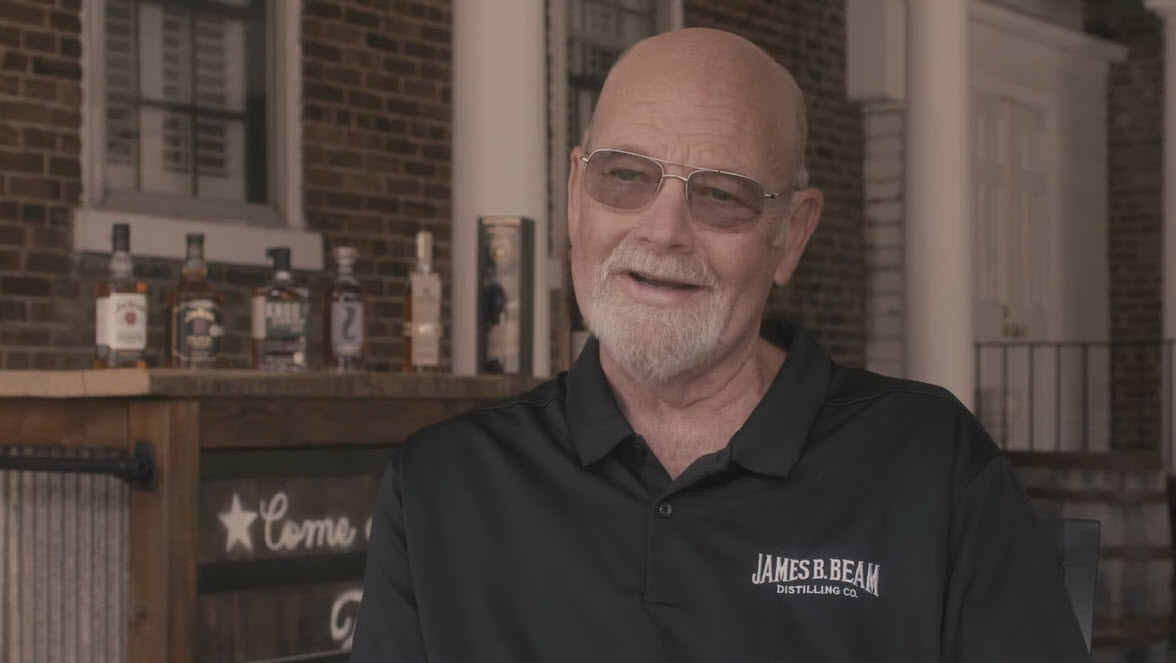
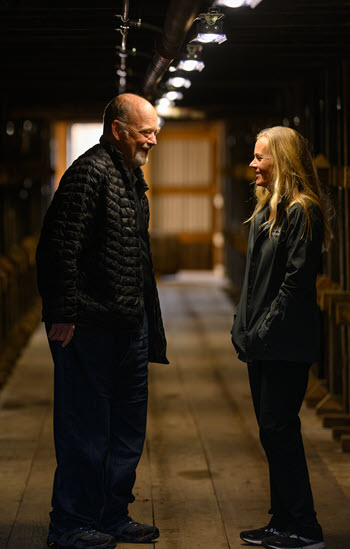
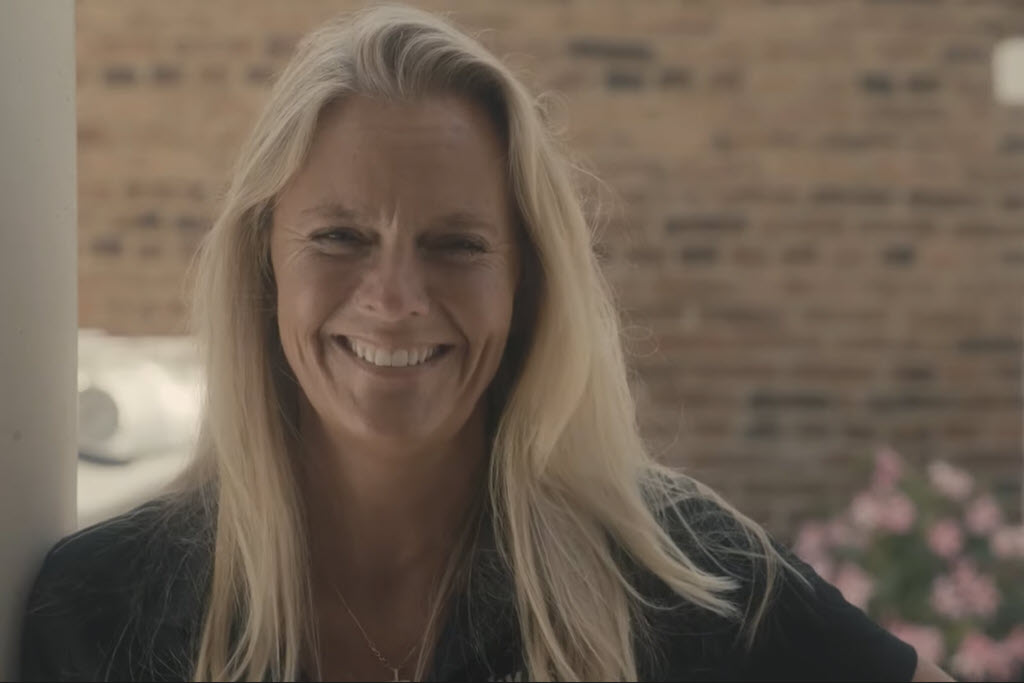
“DeeAnn and I have been friends for 25 years,” Noe said. “I call her my work mom.”
“That’s right, I’m the plant mom,” agreed DeeAnn Hogan, plant coordinator at the company’s distilleries in Clermont and Boston, Kentucky.
“If she wants something, she stays after you,” Noe said. “Which is good, that keeps me moving in the right direction. I need a little prodding, you know?”
And prod him she did. When Hogan found out that Noe needed a kidney, she asked him what his blood type was. She kept asking, over and over until Noe finally told her. When she found out they were compatible, she started the screening process and was told that she and Noe were a match.
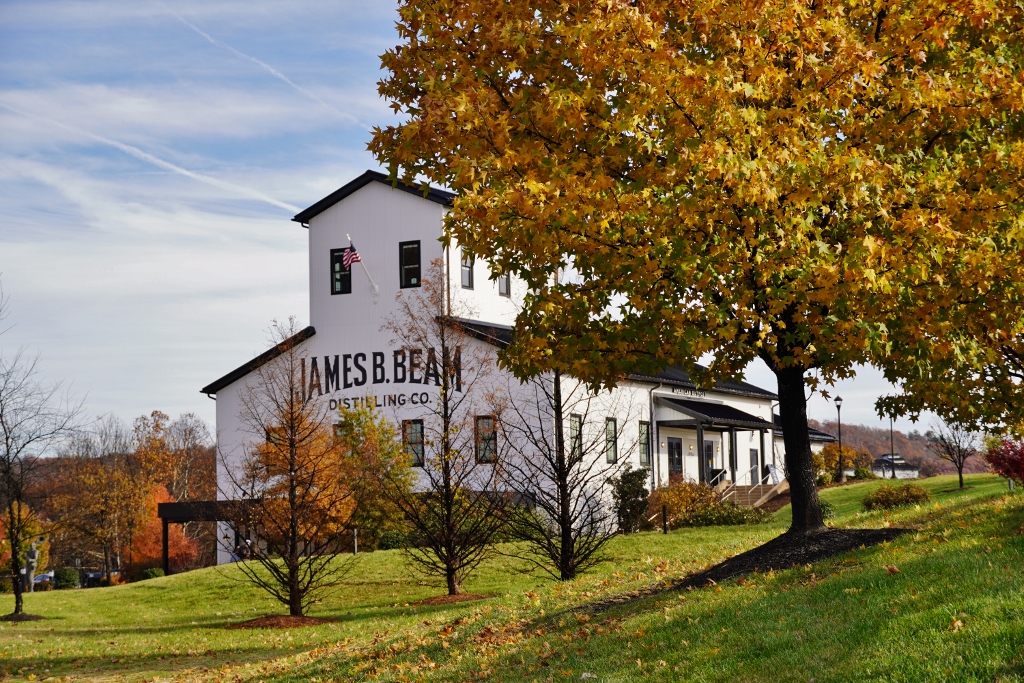
Related Stories
A Day on the Trail: James B. Beam Distilling Co. Officially Reopens and Welcomes Fans to ‘The Kitchen Table’
How to Drink Bourbon using ‘The Kentucky Chew’ according to Jim Beam Master Distiller Fred Noe [VIDEO]
A Jim Beam Family Milestone: Master Distillers Fred and Freddie Noe Fill & Sign the 17 Millionth Barrel of Bourbon
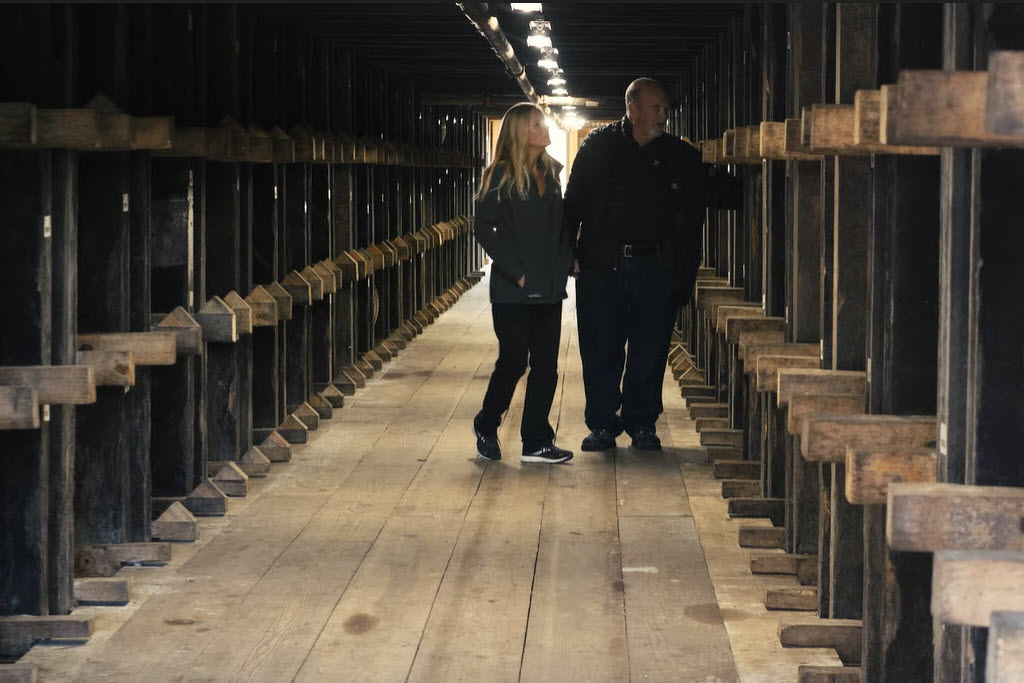
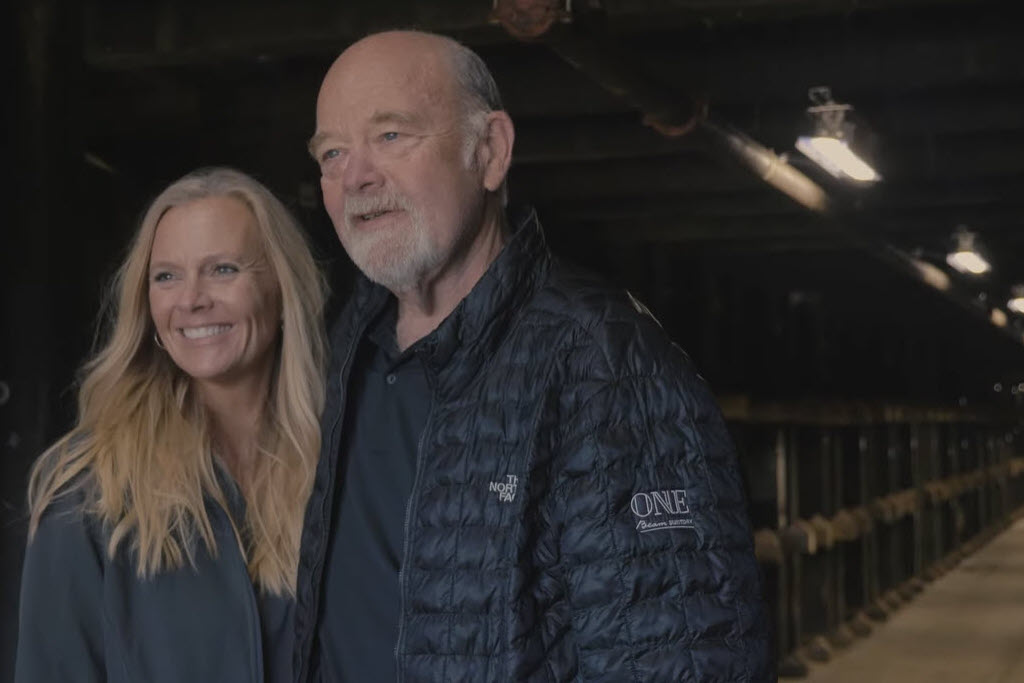
Stay Informed: Sign up here for the Distillery Trail free email newsletter and be the first to get all the latest news, trends, job listings and events in your inbox.
“And that was it,” she recalls. “I prayed about it, and God told me. It was on New Year’s Day, and I was praying about it when Fred texted me to say ‘Happy New Year, my friend.’ And I had my answer.”
For Hogan, the chance to help Noe came after a missed opportunity to donate to a friend three years prior. A mutual friend of hers and Noe’s needed a kidney and Hogan wanted to help. But an illness in the family prevented her from being able to follow through. When Noe was in need, Hogan had already done the research and was ready to step up.
“I’m a pretty giving person,” said Hogan. “I try to do everything for the good of all. And God gave me two kidneys, I only need one, and I’m healthy enough. I take care of myself, and all the stars lined up and it was perfect.”
On April 23, Noe and Hogan drove together to the Transplant Center at UK HealthCare’s Chandler Hospital where they met up with Shah. Because of COVID-19 restrictions, Noe and Hogan’s spouses couldn’t go further than the waiting room. So Noe and Hogan went into pre-op, together.
“It was my first experience in a hospital,” said Hogan. “Not even to have my kids. I had my kids at home.”
“I had a knee replacement, but nothing as serious as this kind of surgery,” said Noe. “It was nice having my friend in the room next door.”
After the surgery, Noe said he noticed a difference almost immediately.
“I started dialysis about eight weeks before the transplant,” Noe said. “I always thought you were supposed to feel better after dialysis, but I couldn’t do much of anything. I felt sluggish and just sat around the house. I didn’t have much of a desire to do anything. After the transplant, I was up walking and doing stuff again. It was almost immediate.”
This is a big deal, as Noe is a titan in the bourbon industry and the face of James B. Beam Distilling Co. brands like Jim Beam, Knob Creek, Basil Hayden’s and Booker’s. He traveled constantly to promote the brand. The COVID-19 pandemic and the decline of his kidney function forced him to slow down and hand over some of the operations to his son Distiller Frederick “Freddie” B. Noe IV. Leadership at the distillery’s parent company urged Noe to see kidney specialists in Chicago, but Noe was adamant about staying close to home.
“I trust Dr. Shah and the guys at UK,” Noe said. “Why would I want to start over with someone else?”
“Aside from the obvious convenience of having your transplant done close to home, you want to be close to a team that knows you in case something goes wrong,” said Shah. “If you have your transplant 300 miles away, and you start having a problem, you go to the closest hospital where they must figure out, among other things, what therapies you received. Of course, we’re going to take care of them, but it’s not the best way to deliver patient care. And for someone like Fred, who has the resources to go anywhere for his care, he chose to stay close to home because he knew us and he trusted us.”
Now seven months after their surgeries, Noe and Hogan have both recovered well. Noe reports feeling better than he has in years.
“DeeAnn told me, ‘If I give you this kidney, you’re going to have to start walking every day.’ So I’m walking every day,” said Noe. “Now I’m feeling really, really good. I’m not allowed to get out in crowds and stuff yet — my immune system is still a little restricted from the transplant and the medicines — but I feel great. I feel a lot better than I did before April 23.”
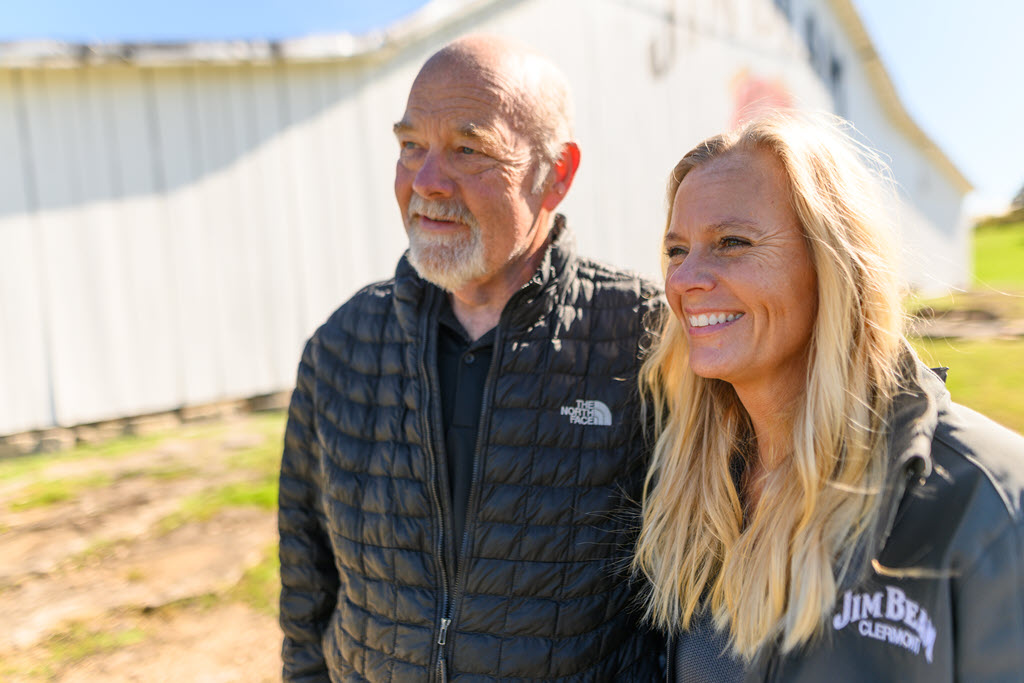
“We text every day,” said Hogan. “He’ll tell me, ‘Hey, I got my walk in today. I’m drinking water.’ And I’ll say ‘I did too.’ We just check on each other every day. I don’t feel a bit different — I would not know that I gave anything away, besides a few little incisions. I’m good to go.”
As they continue to recover, Hogan and Noe are participating in a research study managed by Meera Gupta, M.D. The study, which looks at the long-term physical effects of the transplant on the donor and recipient, involves regular follow-ups and bloodwork in the coming months and years. Noe and Hogan were both happy to have a chance to help other people like them, knowing how life-changing the transplant was for Noe.
Noe has returned to work full time, but is avoiding travel and large crowds due to COVID-19. He’s also made big lifestyle changes, including lots of walking, drinking more water and eating healthier.
“I told Dr. Shah that I did whatever I wanted to do for the 64 years of my life,” Noe recalled. “So I said I’ll do what you guys tell me from now on, so I’ll have a pretty good shot. It is changes I needed to make anyway, so it hasn’t been so bad.”
And Noe has an excellent reason for sticking with his post-transplant protocol.
“My grandson [Frederick “Booker” B. Noe V] lives right next door,” Noe said with a smile. “My father spoiled my son when he was little, so I’m going to spoil this little guy. That’s going to be my job.”
Learn more about the James B. Beam Distilling Co.
View all Bardstown and Nelson County Distilleries.
View all Kentucky Distilleries.
View all U.S. Distilleries.
How Do I Donate Life?
Sharing the gift of life can have a profound impact on another person. Someone who is on the waiting list for a kidney could potentially wait years. Living donors can make a big difference in their quality of life and potentially save their life. If you’re interested in becoming a living donor like DeeAnn Hogan, contact UK HealthCare’s Transplant Center.




